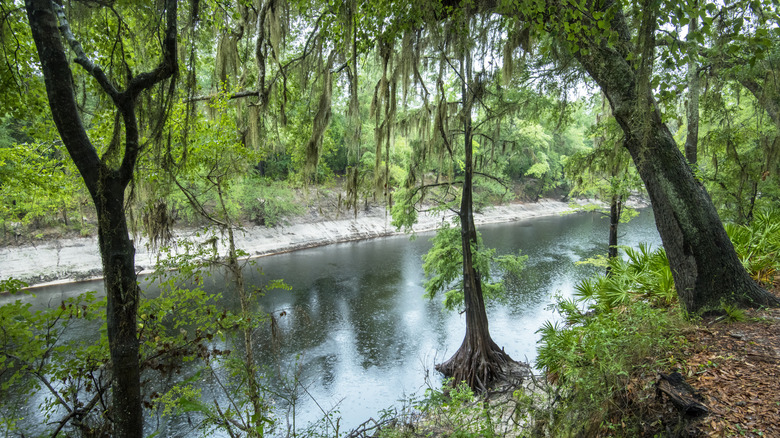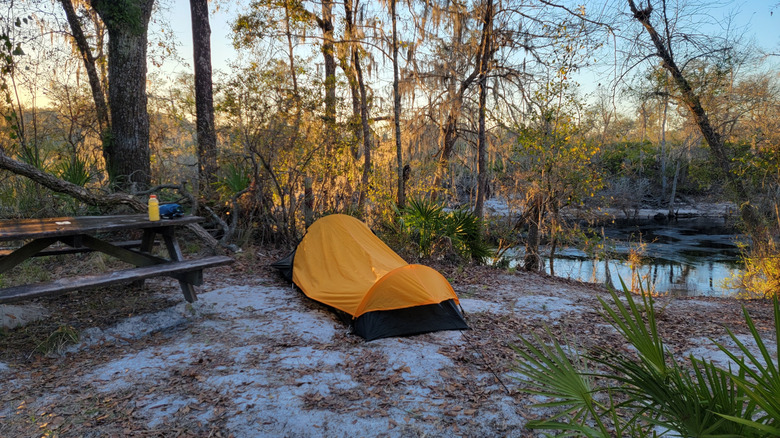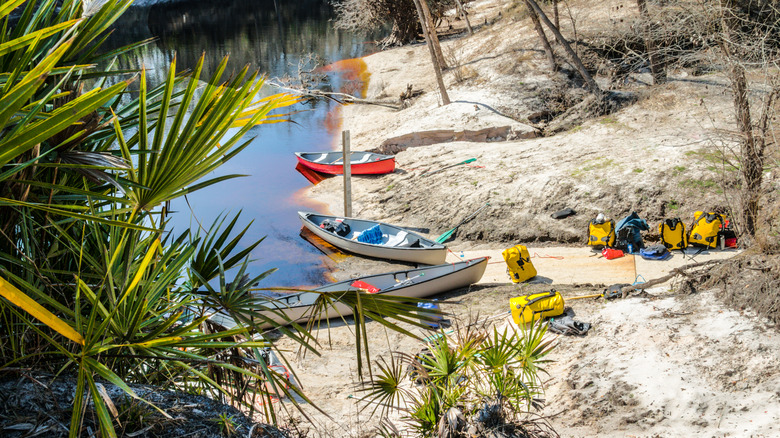One Of Florida's Most Underrated State Parks Is An Outdoor Paradise To Hike, Canoe, And Camp
When it comes to Florida's great outdoors, big-name attractions like Everglades and Biscayne National Parks often get all the attention from visitors. There are countless underrated state parks that even native Floridians tend to forget about; Stephen Foster Folk Culture Center State Park in the town of White Springs is one of those destinations.
Situated between Jacksonville and Tallahassee, the park is best accessed by car, whether it's your own or you rent one from the airport. If you're visiting from out of state, it'll be an hour-and-15-minute drive from Jacksonville International Airport or just under two hours from Tallahassee International Airport. Service to the nearest passenger rail stations — the Amtrak stops in Lake City to the south and Madison to the west — was suspended in 2005 after Hurricane Katrina. At the time of writing, entry is $5 for cars with two or more passengers, $4 for single-occupancy vehicles, and $2 for pedestrians and bicyclists.
Stephen Foster Folk Culture Center State Park is named after the composer of "Old Folks at Home," the beloved 19th-century folk song that was designated as the Florida state song in 1935. It's situated on the banks of Suwannee River, the famous body of water referenced in the song's lyrics. The park is more than just 800 acres of protected wilderness and winding trails for hikers and bikers. The Stephen Foster Folk Culture Center, a museum dedicated to the composer, is on site, offering an in-depth history lesson before you head into the park or after your day spent in nature. You can also hear his music at the Stephen Foster Memorial Carillon, a 200-foot-tall bell tower complete with a museum inside and 97-chime system that rings out quarter-hour.
Outdoor activities from hiking and biking to camping and horseback riding
The Stephen Foster Folk Culture Center and nearby campanile are just the tip of the iceberg when it comes to activities at this under-the-radar state park. If you're looking to work up a sweat, check out Foster's Hammock Trail, an 6.8-mile trek through swamp forest, hammocks, and piney flatwoods that crisscrosses other, shorter routes through park lands. Hikers, bikers, and horseback riders can see gopher tortoises, box turtles, white-tailed deer, and wood ducks. If you're a hiker looking for something a little less lengthy and strenuous, there's a 4.7-mile stretch of the Florida National Scenic Trail, better known as the Florida Trail that spans 1,500 miles across the state, inside the park. Get lost in the network of trails, but just make sure you're back safe before sundown.
If you're looking for something more leisurely, you can hang back at the campgrounds on site and read a book by your tent. The main campground offers 45 stalls with electricity, water, picnic tables, and a fire pit. There's also a dump station and two ADA-compliant restrooms with showers. Make sure to keep any pets on a 6-foot leash.
Interested in roughing it just a little more? Head about 1,500 feet away from the park's main campground to reach Carter Camp and Cable Crossing, two primitive camping sites providing a back-to-basics experience in the heart of the park's thickets without any running water, electricity, or restrooms. Getting there is part of the fun, as the grounds can only be reached via dirt road.
Experience the legendary Suwannee River by canoe
After hearing Foster's famous "Old Folks at Home" tune at the museum, make your way down to the banks of the Suwannee River itself to immerse yourself in a priceless piece of Florida history. Depending on the water level of the river, visitors can access the Suwannee by canoe for about six months out of the year. Canoe rentals are available offsite at American Canoe Adventures just outside the park entrance. The launch for canoes and kayaks is next to the river gazebo on the park's southeastern edge.
Sometimes, if the water flow is low enough, you'll be able to see stunning limestone rock formations and explore tiny caves in your canoe or kayak. You can also get up close and personal with alligators and turtles, though for both of your safety, it's best to keep your distance and admire them from afar; Florida is home to some of the most alligator-infested waters in the U.S., after all. Make sure you call ahead to ensure the canoe launch is open, as the park will close it when the water level rises above 62 feet.
You can even catch your dinner on your canoe trip, provided you adhere to local fishing guidelines. The river is filled with large-mouth bass, black crappie, channel catfish, and other varieties of sunfish and bream. You'll need a freshwater fishing license from the Florida Fish and Wildlife Conservation Commission, available to state residents for $17 a year at the time of writing; non-residents can secure one for $17 for three days or $30 for a week. All fishing must conform to Florida regulations regarding size, number, method of capture, and season.


